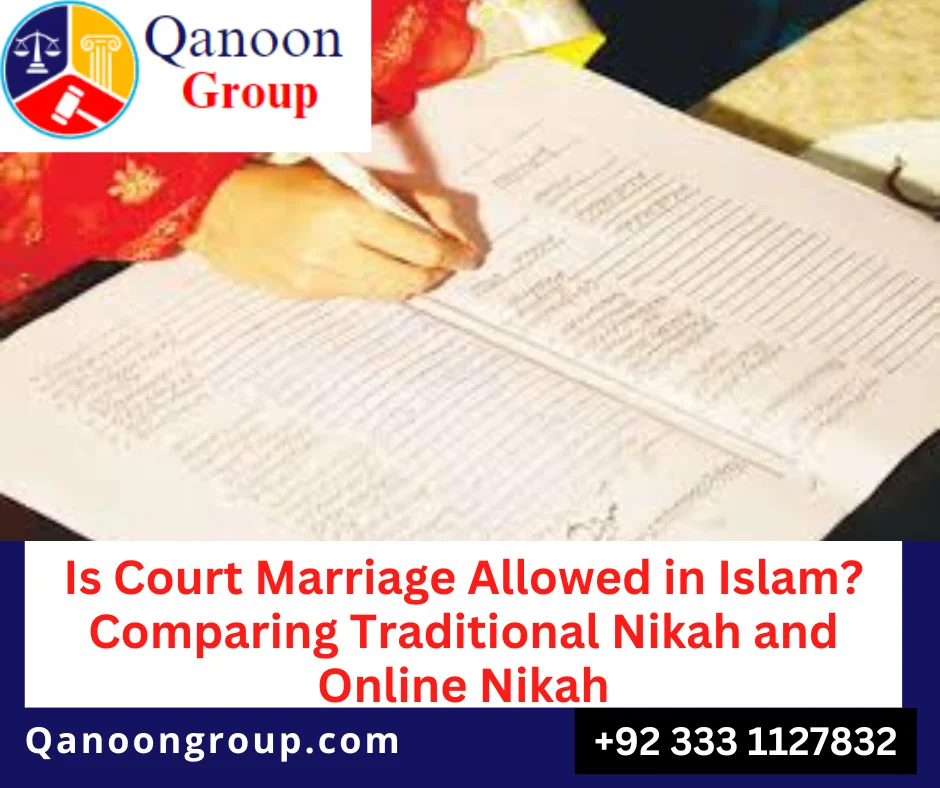Is Court Marriage Allowed in Islam? Comparing Traditional Nikah and Online Nikah
Get an answer to any query about Court
Court Marriage and Online Nikah in Islam
In the evolving landscape of marriage practices, the concept of court marriage has garnered significant attention, particularly in urban settings like Pakistan. While traditional Nikah ceremonies have long been a staple of Islamic marital practices, the rise of online Nikah and the use of legal frameworks offer new dimensions to the discourse. This blog delves into whether court marriage is allowed in Islam, comparing traditional Nikah with online Nikah and exploring the role of proxies or attorneys in Islamic marriage.
Traditional Nikah: The Pillars of Islamic Marriage
Traditional Nikah remains a cornerstone of Islamic marital practices, deeply embedded in religious and cultural traditions. Here’s a closer look at its essential components:
- Ceremonial Rituals: Traditional Nikah is conducted through a formal ceremony led by an Islamic scholar or local religious leader. The ceremony involves reciting specific Quranic verses and prayers, emphasizing the sacred and legal nature of the union.
- Offer and Acceptance (Ijab and Qabul): A fundamental element of traditional Nikah is the mutual consent of both parties. The bride’s guardian typically makes the offer, which the groom must promptly accept in the presence of witnesses. This exchange underscores the voluntary and consensual nature of the marriage.
- Mahar (Dower): The Mahar is a mandatory gift from the groom to the bride, reflecting respect and commitment. This financial provision is crucial for ensuring the bride’s security and signifies the groom’s responsibility within the marriage.
- Witnesses and Documentation: Witnesses play a vital role in validating the Nikah. Traditional Nikah is documented through the Nikah Nama, a marriage contract signed by both parties, witnesses, and the officiating scholar.
- Role of Proxies: In Islam, the Nikah can also be conducted through a proxy (Vakil). This allows the bride or groom to appoint an attorney or representative to perform the Nikah on their behalf. This practice is recognized in many Muslim countries, including Pakistan, where the official Nikah Nama form includes columns for the names and addresses of the Vakils or attorneys.

Online Nikah: Modernizing the Marriage Process
Online Nikah offers a contemporary approach to marriage, leveraging digital platforms to facilitate the process. Here’s how it compares to traditional Nikah:
- Digital Convenience: Online Nikah allows couples to complete the marriage process virtually, which is particularly advantageous for those living abroad or in remote areas.
- Compliance with Shari’a Law: Despite its digital format, online Nikah must adhere to Shari’a law, including mutual consent, the presence of witnesses (virtually), and the proper execution of the Nikah contract.
- Legal and Religious Validity: Online Nikah can be legally recognized in Pakistan if it complies with state regulations and Islamic principles. This involves submitting necessary documents, such as identification and affidavits, and conducting the Nikah through a licensed online platform.
- Documentation and Verification: Similar to traditional Nikah, online Nikah requires proper documentation. The Nikah Nama is electronically signed and verified, ensuring that all legal and religious requirements are met.
Comparing Traditional Nikah and Online Nikah
- Procedural Differences: Traditional Nikah involves physical ceremonies and the presence of witnesses, while online Nikah utilizes digital platforms. Both methods must uphold Islamic principles, including mutual consent and the proper execution of the Nikah contract.
- Accessibility and Convenience: Online Nikah offers accessibility and convenience, particularly for couples who cannot be physically present for a traditional ceremony. However, it must still respect the core elements of Islamic marriage to be considered valid.
- Cultural and Religious Significance: Traditional Nikah holds significant cultural and religious value, while online Nikah provides modern convenience. Both methods must respect the spiritual and legal dimensions of marriage to ensure acceptance in the Islamic context.
- Legal Recognition: Both traditional and online Nikah can be legally recognized in Pakistan if they comply with relevant laws and regulations. Online Nikah must meet specific legal requirements to ensure its validity and acceptance.
- Role of Proxies: Both traditional and online Nikah can involve proxies or attorneys who represent the parties. This practice allows for flexibility in circumstances where the bride or groom cannot be physically present. The inclusion of proxies in the Nikah Nama form in Pakistan underscores the importance of this practice in accommodating various marital situations.


Is Court Marriage Allowed in Islam?
Court marriage is allowed in Islam as long as it adheres to Shari’a principles. This includes ensuring mutual consent, the presence of witnesses, and the proper execution of the Nikah contract. Court marriage provides a legal framework that aligns with Islamic teachings, offering both legal and religious recognition to the union. The use of proxies or attorneys further demonstrates Islam’s flexibility in accommodating different circumstances while maintaining adherence to Islamic principles.
Traditional Nikah and Online Nikah, Both Offer Valid Pathways to Marriage in Islam
In summary, both traditional Nikah and online Nikah offer valid pathways to marriage in Islam, each with its own set of advantages and considerations. Traditional Nikah remains a deeply-rooted practice with significant cultural and religious value, while online Nikah provides modern convenience and accessibility. The role of proxies in both traditional and online Nikah highlights Islam’s adaptability to various situations while ensuring adherence to core Islamic principles. Court marriage, as part of this framework, plays a crucial role in providing a comprehensive legal and religious foundation for marital unions in Pakistan and beyond.
